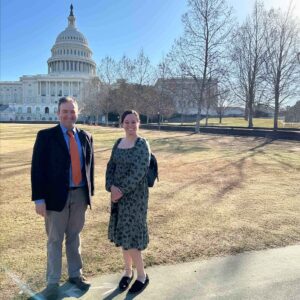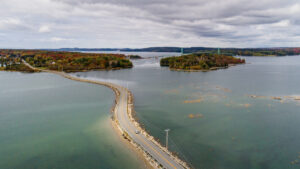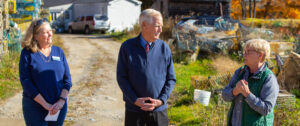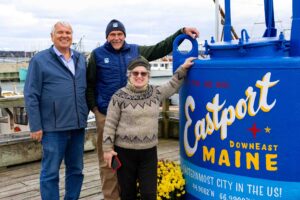
With rapid changes at the federal level—from the status of federal funding to possible lobster tariffs—we know that our coastal communities are facing an increasing level of uncertainty. To meet the current moment, we are ramping up our established policy team efforts in Washington, DC, and Maine.
Recently, our Policy team spent the day on Capitol Hill meeting with staff from all of Maine’s congressional delegation. We had the opportunity to briefly connect with both Senator Collins and Senator King and held productive conversations with several federal offices and agencies about the priorities that matter most to the coast of Maine.
One of our top priorities, as always, is to make sure that the important work happening in Maine communities isn’t left out of conversations in Washington.
The communities and organizations Island Institute serves can count on us to be their trusted voice and advocate.
With the acknowledgment that much of this is changing daily, here are a handful of things we are focused on as of mid-March:
CDS Requests from Communities

We are disappointed that the federal funding for the remainder of FY25 did not include Congressionally Directed Spending (CDS) requests. Communities across Maine have worked hard on proposals that would fund much-needed projects, and in many cases funding through the CDS program is the only way these projects receive funding. Currently, we know that the Town of Chebeague Island is seeking funding to improve the safety and resiliency of its Stone Pier, a critical piece of infrastructure to the island and its economy. We’re also hearing concerns from places like Deer Isle where a CDS request to improve the causeway between the mainland and towns of Deer Isle and Stonington represents the only land connection between the islands and the mainland, an essential economic connection for businesses, as well as residents and visitors. We know other communities have important projects that are now on pause.
Working Waterfront Disaster Mitigation Tax Credit

This is a bill that Senator King and Representative Pingree have introduced to establish a 30% tax credit on up to $1 million in mitigation expenses for working waterfront business owners who make resilience improvements. The next step is to get the bill “scored” to see how much it will cost. We are glad to report that this idea has bi-partisan support in both the House and Senate. While we were in DC, we met with staff from the co-leads on this idea, Senator Bill Cassidy of Louisiana, and Representative Greg Murphy of North Carolina, to discuss the importance of the tax credit and convey the urgency of the need on the coast of Maine. Both of these members sit on important tax-writing committees and care deeply about working waterfront infrastructure in their states.
.
.

ETIPP (Energy Technology Innovation Partnership Project)
For the past several years, Island Institute has worked hard to establish and implement the ETIPP program in Maine. ETIPP is a collaboration between regional organizations with strong relationships in rural towns (such as Island Institute) and the Department of Energy’s National Laboratories. The partnership addresses local, rural energy needs and the potential for self-sufficient energy resources. Projects are community-driven and grounded in the economic realities of rural, coastal and island communities and their grids. Established in 2019, ETIPP is funded through annual Appropriations Committee report language that Senators Collins and Murkowski secure. So far, the program has supported 57 local governments, helping rural communities learn from shared challenges. Island Institute has enrolled 14 Maine communities in the ETIPP collaboration as well as 9 communities in other New England states. It’s critical to the populations Island Institute serves that ETIPP continue, and we’re glad to report that the entire Maine delegation is very supportive of this work.
Here in maine
In Maine, we are really excited about the attention working waterfronts are receiving; they were included in the recent Maine Climate Council report and have been a significant part of the IRRC (Independent Regulatory Review Commission) process. We have been leading the State’s Working Waterfront Coalition and helping to connect the ideas and needs we collectively see in communities to actionable recommendations for the IRRC report. This work represents more and broader attention to the issues facing working waterfronts than I have seen in the last 15 years of working deeply to support these important places.
All in all, we remain hopeful that by assessing community risks and advocating for the people who live and work on Maine’s coast, we can support island and coastal communities through this time of unparalleled uncertainty. Thank you for your continued support of this important work, and thank you for considering a gift today to Island Institute.

